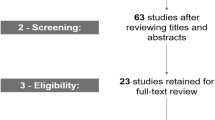Abstract
Preservice teachers in a science methods course were provided instruction on performance assessment, then guided through a design and implementation process of performance assessment tasks. We assessed the effect of designing and implementing a performance assessment task on preservice teachers' understanding of standards-based assessment. The findings show that these preservice teachers improved in their understanding of assessment as a formative process as well as their science content understanding of the topic addressed in their designed task. We found that preservice teachers need to experiment with performance assessment tasks in an authentic context in order to understand the full potential and value of the task.
Similar content being viewed by others
References
American Association for the Advancement of Science (AAAS) (1993). Benchmarks for science literacy: A project 2061 report. New York: Oxford University Press.
Anderson, R. & Mitchener, C. (1994). Research on science teacher education. In D. Gabel (Ed.), Handbook of research on science teaching and learning (pp. 3–44). New York: Macmillan.
Bogdan, R. & Biklen, S. (1992). Qualitative research for education: An introduction to theory and methods. Boston, MA: Allyn and Bacon.
Borko, H., Mayfield, V., Marion, S., Flexer, R. & Cumbro, K. (1997). Teachers' developing ideas and practices about mathematics performance assessment: Successes, stumbling blocks, and implications for professional development. Teaching and Teacher Education, 13(3), 259–278.
Champagne, A. B. & Kouba, V. L. (2000). Writing to inquire: Written products as performance measures. In J.J. Mintzes, J.H. Wandersee & J.D. Novak (Eds.), Assessing science understanding: A human constructivist view (pp. 223–248). San Diego, CA: Academic Press.
Darling-Hammond, L. & Falk, B. (1997). Using standards and assessment to support student learning. Phi Delta Kappan, 79, 190–199.
Dickinson, V.L., Burns, J., Hagen, E. & Locker, K.M. (1997). Becoming better primary science teachers – a description of our journey. Journal of Science Teacher Education, 8, 295–311.
Fuchs, L., Fuchs, D., Karns, K., Hamlett, C. & Katzaroff, M. (1999). Mathematics performance assessment in the classroom: Effects on teacher planning and student problem solving. American Educational Research Journal, 36, 609–646.
Firestone, W., Mayrowetz, D. & Fairman, J. (1998). Performance-based assessment and instructional change: The effects of testing in Maine and Maryland. Education Evaluation and Policy Analysis, 20, 95–113.
Kelly, M.K. & Kahle, J.B. (1999). Performance assessment as a tool to enhance teacher understanding of student conceptions of science. Paper presented at the annual meeting of the National Association for Research in Science Teaching, Boston, MA.
McTiighe, J. (1999). Performance task blueprint. In Washington State Office of Superintendent of Public Instruction (Ed.), Second performance assessment summer workshop manual (p. 39). Seattle, WA: Office of the Superintendent of Public Instruction.
Miles, M. & Huberman, A. (1994). Qualitative data analysis. Thousand Oaks, CA: Sage.
National Research Council (NRC) (1996). National science education standards. Washington, DC: National Academic Press.
Peterson, P., Fennema, E., Carpenter, T. & Loef, M. (1989). Teachers pedagogical content beliefs in mathematics. Cognition and Instruction, 6(1), 1–40.
Putnam, R. & Borko, H. (2000). What do new views of knowledge and thinking have to say about research on teacher learning? Educational Researcher, 29, 4–15.
Roth McDuffie, A., Akerson, V. & Morrison, J. (2003). Designing and implementing meaningful field-based assessment methods for mathematics methods courses: A theoretical framework and program description. The Mathematics Educator, 13(1), 22–32.
Schoon, K.J. & Sandoval, P.A. (1997). The seamless field experience model for secondary science teacher preparation. Journal of Science Teacher Education, 8(2), 127–140.
Shavelson, R.J., Baxter, G.P. & Pine, J. (1992). Performance assessments; political rhetoric and measurement reality. Educational Researcher, 22–27.
Shepard, L. (2000). The role of assessment in a learning culture. Educational Researcher, 29(7), 4–14.
Shepard, L., Flexer, R., Hiebert, E., Marion, S., Mayfield, V. & Weston, T. (1996). Effects of introducing classroom performance assessment on student learning. Educational Measurement: Issues and Practices, 15, 7–18.
Shymansky, J.A., Chidsey, J.L., Henriquesz, L., Enger, S., Yore, L.D., Wolfe, E.W. & Jorgenson, M. (1997). Performance assessment in science as a tool to enhance the picture of student learning. School Science and Mathematics, 97, 172–183.
Spector, B.S. (1999). Bridging the gap between preservice and inservice science and mathematics teacher education. Paper presented at the annual meeting of the National Association for Research in Science Teaching, Boston, MA.
Stenmark, J. (1991). Mathematics assessment: Myths, models, good questions, and practical suggestions. Reston, VA: National Council of Teachers of Mathematics.
Strauss, A. & Corbin, J. (1990). The basics of qualitative research: Grounded theory procedures and techniques. Newbury Park, CA: Sage.
Washington Commission on Student Learning (1998). Essential academic learning requirements. WA: Olympia.
Author information
Authors and Affiliations
Corresponding author
Rights and permissions
About this article
Cite this article
Morrison, J.A., Roth McDuffie, A. & Akerson, V.L. Preservice Teachers' Development and Implementation of Science Performance Assessment Tasks. Int J Sci Math Educ 3, 379–406 (2005). https://doi.org/10.1007/s10763-004-5108-x
Issue Date:
DOI: https://doi.org/10.1007/s10763-004-5108-x



